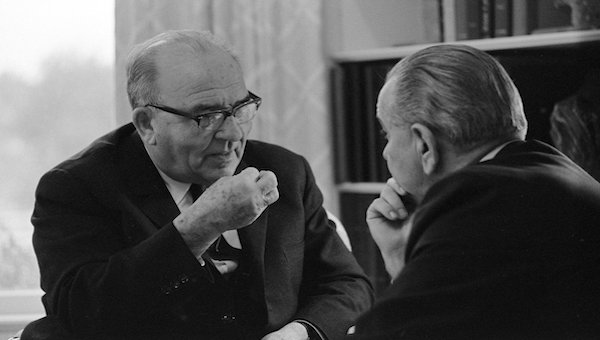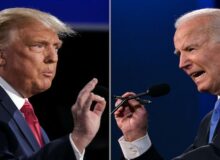America and Israel
One of the biggest falsehoods about Israeli/U.S. History is that the two countries have been best friends since Israel was created in 1948. For the first twenty years of her existence, the United States was not Israel’s staunchest ally. Believe it or not, France was the Jewish State’s biggest benefactor. Czechoslovakia sold the nascent State of Israel weapons.
The U.S. was the first country to recognize Israel after she declared independence in May 1948, but that was because of the strong will of Harry Truman wanting to do the right thing over the objections of an Arabist State Department (some things never change). The War for Independence was not won with American Weapons. The U.S. refused to sell weapons to Israel. And Great Britain was training the Arab forces and flying some bombing runs.
When Israel joined with France and Britain in 1956 to take over the Sinai and open up shipping lanes closed by the Egyptians, it was the U.S. .that forced Israel to get out, leading to a repeat of the blockade and the Six-Day-War eleven years later. There was no U.S. help in the Six-Day War despite the Arab nations receiving a healthy supply of arms from the USSR. It wasn’t until after the Six-Day War and a meeting with President Lyndon Baines Johnson that the U.S. began to move toward a strong friendship with the State of Israel. In fact, when LBJ was President, the United States became Israel’s chief diplomatic ally and primary arms supplier.
Soon after the 1967 war, Soviet premier Aleksei Kosygin asked Johnson at the Glassboro Summit why the U.S. supported Israel when there were 80 million Arabs and only 3 million Israelis. “Because it is right,” responded the straight-shooting Texan.
Among his jobs, during his almost three-decades-long service to Israel, Yehuda Avner was a speechwriter and advisor to PM Levi Eshkol. He wrote a blow-by-blow story called about the Prime Minister’s meeting with LBJ called On The Seventh Day. The seventh day referred to the day after the Six-Day War.
Eshkol’s meeting with Johnson resulted in the first substantial military aid from the U.S. to Israel. As Avner’s article is very long, the below is edited by taking the emotional and physical descriptions of the involved parties,
Israeli Prime Minister Levi Eshkol sought an urgent meeting with President Lyndon Johnson who, in January 1968, extended to him a friendly invitation to his Texas ranch.
Without ado, the Prime Minister bent his mind to the hub of his argument:
“The heart of my mission, Mr. President,” he said, “is how to create peace in the Middle East at a time when the Syrian and Egyptian armies are being rebuilt by the Soviets at a menacing pace – so fast that the Arab leaders are contemplating renewed war.”
“How fast?” asked Johnson.
“Egypt, Syria, and Iraq have already replenished their air forces to a combined strength of 460 fighters and 47 bombers,” answered Eshkol. “Egypt alone is now almost back to its prewar air strength. Moreover, the quality of their aircraft is vastly improved.”
“And their ground forces, what of them?” asked the president.
“In tanks,” replied the premier referring to a typed page, “the Egyptians are almost back to their prewar strength. The Egyptian navy is stronger than before, with rocket-equipped vessels. The number of ground troops is rapidly rising beyond their June 1967 strength.”
“Do you see signs of an actual Russian physical presence there?”
“Certainly. Our assessment is that there are at least 2,500 Soviet military experts in Egypt today.”
“OK, that’s the Arab side. Now, what about your side? What do you have?
Eshkol’s response, when it came, was slow, soft, and disturbing:
“We have no more than 150 aircraft, all French, 66 of them virtually obsolete. The French are contracted to send us 50 more, but because of their boycott, we won’t get them. In a word, Mr. President
“So what are you asking for exactly? Spell it out.”
“What I’m asking for, Mr. President is the one aircraft that has the necessary range and versatility to enable us to face down our enemies. I’m asking for your F-4 Phantom jets.” The Phantom was America’s newest state-of-the-art fighter-bomber.
“Mr. President please understand, my country is extremely vulnerable. One defeat in the field can be fatal to our survival. What I ask of you is the minimum for our self-defense. Without those Phantoms, we will be deprived of our minimum security. We need 50 Phantoms as rapidly as possible.”
Mr. President, last June our enemies tried to destroy us, and we defeated them all. Had we waited one more day, even one more hour, before forestalling them the outcome might have been very different. Yet I come here with no sense of boastful triumph; nor have I entered the struggle for peace in the role of victor. The only feeling I have is one of relief that we were saved from a national disaster, and I thank God for that. Now, all my thoughts are turned toward winning the peace – peace with honor between equals.”
“That is a noble thought,” said Johnson.
“Thank you, but we need the tools to help bring that peace about. I regret to say that the United States is the only source we have for those tools. Within two years our Arab neighbors will have 900-1,000 Soviet aircraft. So it’s an either/or situation. Either you provide us with the arms we need, or you leave us to our fate. It’s as simple as that. Mr. President, Israel is pleading for your help.”
After some thought, President Johnson answered, “I am impressed by your statement, Mr. Prime Minister. However, as you know, we are facing a difficult situation in Vietnam, calling on our resources. I suggest, therefore, you look elsewhere to find your weapons, not only here in the United States.”
Eshkol responded, “Please tell me where. I would be delighted to look elsewhere if you can give me an address.”
“That’s as maybe, but I regret that your visit here is so closely tied to this matter of the Phantoms. Planes won’t radically change your realities. Your big problem is how two-and-a-half million Jews can live in a sea of Arabs.”
Secretary of state Dean Rusk chimed in, “Mr. Prime Minister, in all honesty, whatever efforts Israel makes in the field of military build-up, the Arabs will better you every time. If the Arabs see an Israel they cannot live with, one that is intolerable to them, they won’t back away from an arms race. On the contrary, they will turn increasingly to the Soviets, to the detriment of the American interest. So what we would like to hear from you today is, what kind of an Israel do you want the Arabs to live with, and what kind of an Israel do you want the American people to support? The answer, surely, is not to be found in military hardware.”
“These are difficult remarks you are making, Mr. Secretary,” said Eshkol stonily. “All I can say to you now is that our victory in the Six-Day War blocked the Soviet Union from taking over the Middle East; and that, surely, is an American interest. As for the kind of an Israel the Arabs can live with and which the American people can support, the only answer I can presently give is an Israel whose map will be different from the one of the eve of the Six-Day War.”
“How different?” quizzed Rusk.
Eshkol responded from his heart. “Please understand, we did not want that June war. We could have lived indefinitely within the old pre-1967 armistice lines. But now that there has been a war, we cannot return to those old, vulnerable frontiers.”
Trying to cool things down, Johnson suggested a break. When the talks restarted LBJ said he would like to try and get a peace process going, to which Eshkol interjected with uncharacteristic adamancy:
“Mr. President, I would love somebody here in this room to tell me when and where and how I can get a peace process going. I wouldn’t be here asking for Phantoms if somebody could tell me that. But instead of peace, we are faced with unprecedented Arab rearmament that again threatens our very existence. The immediate issue is the means to defend ourselves against another attempted onslaught. Israel feels weaker now than before the Six-Day War. Why? Because as you rightly said, we are a small country of two-and-a-half million Jews surrounded by a sea of Arabs. So what are we supposed to do – wait until Russia gives them so many planes that they can dictate their terms at will?”
“Mr. President,” he galloped on, “the State of Israel is the last chance for the Jewish people. I pray with all my heart to avoid another war. But I know of only one address to acquire the means to defend ourselves – and that address is you.”
Robert McNamara, the secretary of defense, raised a finger: “Having studied the evidence, it seems clear to me that two-and-a-half million Jews truly cannot withstand the whole of the Arab world, particularly if the Arabs are assisted by the Russians. Therefore, the supply of a substantial number of the most sophisticated aircraft could only increase Russian support for the Arabs. At the same time, there is no reason for Israel to say it has been abandoned. This will not occur while President Johnson is president. However, for the U.S .to supply you with planes might greatly increase the supply of Russian planes to the Arabs. So, given these unknowns, we have to proceed with the utmost caution.”
This obscure and contradictory comment aroused the ire of General Motti Hod, commander of the IAF who countered: “The arms race, Mr. McNamara, has never been influenced by what we have in our hangers. The only limiting factor is the Arab capacity to absorb the aircraft the Soviets supply.”
And then to Johnson, “Your secretary of defense says that as long as you, Mr. President, are president, Israel will never be abandoned. Might I suggest that the one way of guaranteeing that, and of assuring that US forces will never have to come to our rescue, is by keeping our air force strong.”
After another break LBJ spoke:
“I think we can agree on three objectives. First, there is the need to do what we can to bring about a stable peace. Second, we are all anxious to deter, if possible, an arms race. Third, the United States has hope and a purpose of assuring, if necessary, adequate equipment to the Israel Air Force to defend itself. And in connection with this goal, I suggest that the following sentence be written into our joint communiqué at the conclusion of this session.”
He picked up a paper, and read: “The president agreed to keep Israel’s defense capability under active and sympathetic review in light of all the relevant factors, including the shipment of military equipment by others into the area.” To this, he added by way of explanation, “This statement will be helpful in deterring the Arabs, and might even push them toward restraint. It also says to the Soviets, ‘Stop, look, and listen.’ And it gives you something concrete, Mr. Prime Minister, to stand on.”
Then came the good news the President ignored the advice of his aides. Yes, you’ll have your Phantoms,” and a deeply relieved prime minister responded, “Thank you, Mr. President. I thank you from the heart.”
Lyndon B. Johnson kept his word. His decision began a profound change in the relationship between Jerusalem and Washington was set in motion. America threw in its strategic lot with Israel so that, henceforth, the United States and Israel would become close allies.
Many U.S. presidents have been seen as particularly good friends of the Jewish State, Truman, Nixon, Bush #43, and Donald Trump, for example. When people list presidents who were particularly good friends of the Jewish State, one man is usually left out, Lyndon Baines Johnson, the man who turned America’s relationship with Israel into a strong alliance.
Like LBJ, I am a big supporter of Israel. That’s why I joined the Zionist Herut Movement. Herut is an international movement for Zionist pride and education and is dedicated to the ideals of pre-World War Two Zionist leader Ze’ev Jabotinsky. Jeff Dunetz (The Lid) is an active member and on the board of the organization. More about Herut can be found at www.HerutNA.org–Please click on this link and consider joining me in this great organization.
America and Israel, America and Israel, America and Israel, America and Israel, America and Israel, America and Israel, America and Israel, America and Israel
Https://lidblog1.wpenginepowered.com






